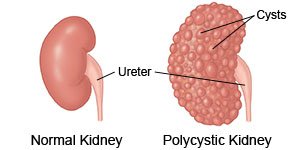Kidney Cyst
Medically reviewed by Drugs.com. Last updated on Sep 23, 2025.
A kidney cyst is a fluid-filled sac that grows in your kidney. A simple cyst usually does not contain cancer. A complex cyst contains calcium deposits and needs to be checked over time for cancer. You may have one or more cysts. Both kidneys may form cysts at the same time.
 |
DISCHARGE INSTRUCTIONS:
Medicines:
- Medicines may be given to relieve pain or to prevent or treat a bacterial infection. Ask your healthcare provider how to take prescription pain medicine safely.
- Take your medicine as directed. Contact your healthcare provider if you think your medicine is not helping or if you have side effects. Tell your provider if you are allergic to any medicine. Keep a list of the medicines, vitamins, and herbs you take. Include the amounts, and when and why you take them. Bring the list or the pill bottles to follow-up visits. Carry your medicine list with you in case of an emergency.
Return to the emergency department if:
- You have blood in your urine or your urine is dark.
- You have trouble urinating, or you are urinating more often than usual.
- You have a fever along with pain or tenderness below your ribcage and above your hip bones.
Contact your healthcare provider if:
- You have questions or concerns about your condition or care.
Follow up with your healthcare provider as directed:
You may need to have ultrasounds to check the size, shape, and contents of the cyst over time. Write down your questions so you remember to ask them during your visits.
Drink liquids as directed:
Liquids help your kidneys work correctly. They can also help prevent a urinary tract infection. Ask your healthcare provider how much liquid to have each day and which liquids are best for you. Ask if you need to limit or not drink alcohol. Alcohol may damage your kidneys.
Manage health conditions:
Over time, conditions such as diabetes and high blood pressure that are not controlled may damage your kidneys.
Do not smoke:
Smoking may narrow blood vessels in your kidneys and raise your blood pressure. Smoking can also damage your kidneys. Ask your healthcare provider for information if you currently smoke and need help quitting. E-cigarettes or smokeless tobacco still contain nicotine. Talk to your healthcare provider before you use these products.
© Copyright Merative 2025 Information is for End User's use only and may not be sold, redistributed or otherwise used for commercial purposes.
The above information is an educational aid only. It is not intended as medical advice for individual conditions or treatments. Talk to your doctor, nurse or pharmacist before following any medical regimen to see if it is safe and effective for you.
Further information
Always consult your healthcare provider to ensure the information displayed on this page applies to your personal circumstances.
